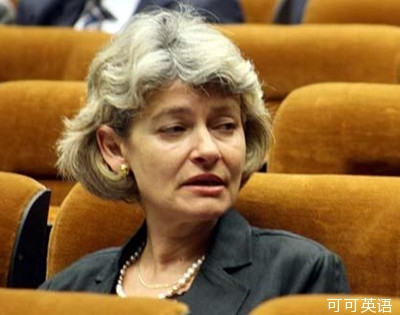(单词翻译:单击)
Message from Ms Irina Bokova, Director-General of UNESCO, on the Occasion of World Arabic Language Day
教科文组织总干事伊琳娜·博科娃在世界阿拉伯文日的致辞
18 December 2013
2013年12月18日
World Arabic Language Day is an opportunity for us to acknowledge the immense contribution of the Arabic language to universal culture and to renew our commitment to multilingualism. Linguistic diversity is a key component of cultural diversity. It reflects the wealth of human existence and gives us access to infinite resources so that we may engage in dialogue, learn, develop and live in peace. The Arabic language bears the treasures of ancient Islamic wisdom, and the voice of poets, philosophers and scientists who placed the strength and beauty of the language at the service of humanity, scholars like the great Avicenna, the 1,000th anniversary of whose The Canon of Medicine we celebrate this year. We can mobilize that strength to spread knowledge, encourage mutual understanding and build spaces of cooperation for development and peace. The Arabic language is also our ally as we seek to improve literacy rates and build knowledge societies with 22 Member States of UNESCO.
庆祝阿拉伯文日,就是承认阿拉伯文对世界文化的巨大贡献、重申我们对使用多语制的主张。语言多样性是文化多样性的重要内容,它反映了人类生活的丰富性,为我们的对话、学习、自我发展及和平生活提供了无尽的资源。阿拉伯文承载着伊斯兰千百年来的智慧宝藏,诗人、哲学家和学者也是借它发声、运用它的力与美来服务人类,如伟大的阿维森纳,我们今年庆祝了其《医典》问世1000周年。我们可以调动这种力量来传播知识,鼓励相互理解,建设促进发展与和平的合作空间。阿拉伯文还是我们在教科文组织的22个会员国改善扫盲工作、建设知识社会的盟友。
This year, UNESCO is emphasizing in particular the role of the media in favour of the reach and reinforcement of Arabic. The media are a key agent of public discourse, and UNESCO is committed to supporting the Arab media as forces of dialogue, information and citizenship. We should strengthen training for journalists and support for media development so as to ensure that Arabic is heard and read in the public arena. Initiatives backed by UNESCO, such as the sixth Arab Free Press Forum, held in Tunis in November 2013, and the Arab Bloggers Summit due to be held in January 2014, are additional opportunities to reflect on the situation and needs of the independent, plural Arab press.
今年,教科文组织特别强调媒体对于推广和加强阿拉伯文的作用。媒体是公共话语的核心要素,教科文组织坚决支持阿拉伯媒体成为对话、信息和宣传公民意识的力量。我们应加强记者培训,支持媒体发展,在公共空间让人听到和读到阿拉伯文。教科文组织的举措,如11月在突尼斯举办的第六次阿拉伯新闻论坛和将于2014年1月举行的阿拉伯博主峰会也为思考独立多元的阿拉伯新闻界状况和需要提供了机会。
The media also encourage us to think about the role of languages as prime instruments in collective life and citizenship. The Arabic language and the possibilities it offers can help the citizens of this globalized world to live together in their diversity. Arabic bears the identities and values of 422 million individuals in the world and of 1.5 billion Muslims who use it for their daily prayers. It drives the reinforcement of the values we share. With this in mind, UNESCO supports the International Council for the Arabic Language, whose role is essential in connecting the Arabic-language cultures and cultures of other languages across the world. UNESCO is involved in a number of regional initiatives designed to promote Arabic, such as the e-platform for teachers, Education for the Twenty-First Century, designed to facilitate knowledge sharing. I renew this day our commitment to bolstering the use of Arabic—and thus the impact and scope of our programmes—in UNESCO’s work with its Member States.
媒体也促使我们思考如何发挥语言这一理想工具的作用来促进集体生活和公民意识。阿拉伯文和它提供的可能性有助于全球化的世界的公民在多样性中共处。阿拉伯文承载着世界上4.22亿人和在每日用它祷告的15亿穆斯林的特性和价值观。它是一个加强我们共同价值观的动力。有鉴于此,教科文组织支持国际阿拉伯文理事会,因为该理事会为连接阿拉伯文文化和世界上其它语言发挥着重要作用。教科文组织参与了多个旨在促进阿拉伯文的地区行动,如为了促进知识分享而设计的面向教师的电子平台《21世纪的教育》。值此世界日,我重申我们将在教科文组织在会员国的工作中加强使用阿拉伯文,这样做也是在加强我们的各项计划的影响和声望。

更多精品翻译素材,敬请关注可可英语。


